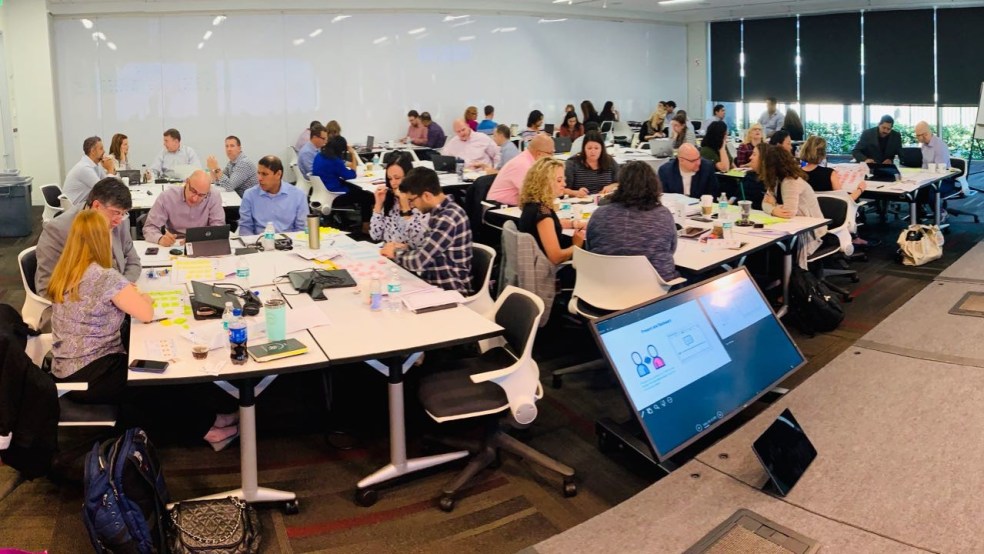Professor Jonathan Lazar PhD, LLM (CHAIR)
Jonathan Lazar, PhD, LLM is a professor in the College of Information Studies at the University of Maryland, where he is the executive director of the Maryland Initiative for Digital Accessibility (MIDA), and is a faculty member in the Human-Computer Interaction Lab (HCIL). Dr. Lazar has over 25 years of experience in research and teaching in human-computer interaction, with a focus on
technology accessibility for people with disabilities, user-centered design methods, assistive technologies, web accessibility, and law and public policy related to accessibility and HCI. Dr. Lazar has authored or edited 16 books, including Research Methods in Human-Computer Interaction (2nd edition, co-authored with Feng and Hochheiser), Ensuring Digital Accessibility Through Process and Policy (co-authored with Goldstein and Taylor), and Accessible Technology and the Developing World (co-edited with Stein). His 17th book, Foundations of Information Law (co-authored with Jaeger, Gorham, and Greene-Taylor) will be published in Fall 2023. Dr. Lazar has published over 200 refereed articles in journals, conference proceedings, edited books, and magazines, and has received research funding from the U.S. National Science Foundation, the U.S. National Institute on Disability, Independent Living, and Rehabilitation Research (NIDILRR), Google, and Adobe. He is the recipient of the 2020 ACM SIGACCESS Award for Outstanding Contributions to Computing and Accessibility and the 2016 ACM SIGCHI Social Impact Award, is a member of the ACM SIGCHI Academy, and he served as the general chair of the 2021 ACM ASSETS conference.
Professor Sarah Sharples
Professor Sarah Sharples is Chief Scientific Adviser for the Department for Transport. She is a Professor of Human Factors in the Faculty of Engineering at the University of Nottingham and from 2018-2021 was Pro-Vice-Chancellor for Equality, Diversity & Inclusion and People. She has led research in transport, manufacturing and healthcare, and has a particular interest in designing systems that successfully integrate novel technologies and people in complex systems in settings including rail, highways and aviation. She was President of the Chartered Institute of Ergonomics and Human Factors from 2015-16.
Professor Alan Penn
Alan is a former Dean of the Bartlett faculty of the Built Environment (2009-19), he is a founding director of Space Syntax Ltd, a UCL knowledge transfer spin out with a portfolio of over 100 applied projects per year, including whole city masterplans, neighbourhood development plans and individual buildings. He is a member of the Space Syntax Laboratory within The Bartlett School of Architecture. He was the Chair of the Architecture, Built Environment and Planning sub-panel 16 and a member of Main-panel C for the Research Excellence Framework 2014. He is a founding trustee of the Shakespeare North Trust a charity which has built a new Shakespearian theatre and educational centre in Prescot outside Liverpool. Between 2019 and 2021 he was Chief Scientific Advisor at the Ministry of Housing, Communities and Local Government, and then the Department for Levelling-Up Housing and Communities. He has now returned to UCL as Professor of Architectural and Urban Computing.
His research focuses on understanding the way that the design of the built environment affects the patterns of social and economic behaviour of organisations and communities. How is it that architecture and urban design matter for those that inhabit them? How is it that the spatial design of cities and neighbourhoods leads to the generation of cultural and community identity? Under what conditions do vital and thriving creative communities occur, and under what conditions does crime and urban malaise develop? In order to investigate these questions he has developed both research methodologies and software tools. These are known as ‘space syntax’ methods. Current research includes the development of agent based simulations of human behaviour, the development of spatio-temporal representations of built environments, investigations of urban spatial networks and the application of these techniques in studies of urban sustainability in the broadest sense, covering social, economic, environmental and institutional dimensions.
Professor Anne Boddington
Anne Boddington is Professor Emerita of Design Innovation and has held executive and senior leadership roles in Higher Education as Dean of Arts & Humanities (Brighton), Pro Vice Chancellor for Research, Business & Innovation (Kingston) and Pro Vice Chancellor for Research and Knowledge Exchange (Middlesex). In 2022 she concluded chairing the UK’s REF2021, Sub Panel (32) for Art & Design: History, Practice & Theory. She has extensive experience of the governance, peer review, research evaluation and assessment and is the current Chair of the Advisory Board for the UKRI’s National Interdisciplinary Circular Economy Research (NICER) programme (£30M), deputy Chair and a trustee of the Design Council, the government’s strategic advisor for design, and a member of both the InnoHK Scientific Committee (Hong Kong) and the Hong Kong Council for Accreditation of Academic and Vocational Qualifications (HKCAAVQ). As an independent consultant she now works as a strategic advisor and mentor and is committed to promoting equity, diversity, and inclusion in practice, developing effective governance, supporting career development, reducing bureaucracy, and improving organisational design, integrity, and productivity in the workplace.
Professor Peter W Halligan CBE DSc PhD FBPS FMedSci FLSW CPsychol
In 2023, Professor Peter W Halligan was awarded a CBE for his services to neuropsychology research and science in government.
An Honorary professor in the School of Psychology at Cardiff University and Bangor, Dr Halligan has qualifications in psychology, philosophy, education, and neuroscience. His theoretical and applied advances in neurological and psychiatric disorders including visual neglect, coronary bypass surgery, hysteria, bio-psycho-social models of illness, beliefs, delusions, phantom limb phenomena, hypnosis and consciousness have received international recognition and funding.
Since 1987, Prof Halligan has published more than 250 peer reviewed journal articles, book chapters and books across a range of subject areas spanning neuro-cognitive and health care sciences and secured over 28,000 citations and a H-index of 84 (Google Scholar). Several of his papers appeared in top rank journals in psychology, psychiatry and medicine including Nature (6 papers), Lancet (7 papers) and Nature Reviews Neuroscience (3 papers), and Trends in Cognitive Science (3 papers). His research work has been reported widely in the national and international media including New York Times, The Times Higher, The Economist, New Scientist, Guardian, Western Mail, BBC, Channel 4, Channel 5, and BBC Radio 4.
A Fellow of the British Psychological Society, the Academy of Medical Sciences and Learned Society of Wales, Prof Halligan was awarded the British Psychological Society’s (BPS) Spearman Medal for outstanding published research in 1993, and 12 years later, the BPS Presidents’ Award for outstanding contributions to psychology. In 2005, he was also awarded the Psychological Society of Ireland’s Special Award for outstanding contributions to psychology.
He is currently Cardiff University’s top ranked academic author in terms of science engagement readership with over 770,000 reads on the Conversation. He has developed and commercialised several clinical tests, produced 4 educational videos, customised medical underwriting training courses and was a member of the QS World University Rankings Advisory Board from 2008 until 2021.
Following degrees at UCD, he joined Oxford’s University’s Department of Clinical Neurology in 1987 where he secured an E. P. Abraham Junior Research Fellow, at Green College and later an MRC Senior Research Fellowship before moving to Cardiff University as Distinguished Research Professor in 2000. At Cardiff, he helped secured over £ 40M funding for several large university research developments including the Cardiff University Brain Repair and Imaging Centre. In 1996, he launched the new journal Cognitive Neuropsychiatry with Prof Anthony David which has played a pioneering role in establishing and shaping cognitive neuropsychiatry, now a vibrant sub-discipline within the cognitive neurosciences. In the same year, he was awarded one of the first Wellcome Trust Sci-Art grants on phantom limb research with artist Alexa Wright (University of Westminster) which later became the focus of a Channel 4 Equinox TV science programme in 1999.
In 2007, with Prof Dylan Jones (Head of School), he organised the commissioning of Peter Randall-Pages’s “Mind’s Eye “art work as part of the School of Psychology’s “Mind Art“project, one of the largest permanent works of art in Cardiff City sited at the main entrance to the School of Psychology, located on Park Place.
From 2010 he was Chair and Academic lead of the Welsh Crucible - a unique, all-Wales staff leadership programme for early career researchers- his team won the Times Higher Education Award for Outstanding Contribution to UK HE Leadership Development in 2013.
From 2015-2018, he served as Chief Executive for the Learned Society of Wales, Wales’s National Academy, (2015-2018) an independent pan-discipline educational charity of over 600 academic research fellows designed to provide public benefit through expert scholarly advice on a variety of national public policy issues related to research, science, engineering, medicine, arts, humanities, and social sciences.
In 2018, he was appointed Chief Scientific Adviser for Wales (CSAW). This First Minister appointment is responsible for promoting science, technology, engineering, and mathematics (STEM) subjects, reviewing scientific advice, and managing the Welsh Government Office for Science and Ser Cymru science capacity and engagement programmes.
Professor Dr. (Ms.) Shashiprabha Kumar
Prof. ShashiPrabha Kumar is currently the Chairperson, Indian Institute of Advanced Study, Shimla; a Distinguished Fellow of Vivekananda International Foundation (VIF), New Delhi and Dean, Sri Sankaracharya Sanskrit Mahavidyalaya, Bharatiya Vidya Bhavan, Delhi Kendra. Earlier she was the Founder Vice Chancellor at Sanchi University of Buddhist-Indic Studies, Madhya Pradesh and Chairperson, Special Centre for Sanskrit Studies, JNU, New Delhi.
Prof. Kumar is an acclaimed Sanskrit Scholar, well versed in classical Indian Philosophy, particularly the system of Vaiśeṣika, which was her area of Ph.D. research at University of Delhi (1983). During her teaching career of almost fifty years, she has supervised/guided fifty-one students for their Post-Doctoral, Doctoral (Ph.D.) and M. Phil research. She has also taught at the Oxford Centre for Hindu Studies U.K. in the Trinity Term, (2007) as Shivdasani Visiting Fellow. She was offered ICCR visiting Chair at Silpakorn University, Bangkok (2008).
Her current research interests include the philosophy of Vedas and Upaniṣads, Vaiśeṣika, Mīmāṁsā and Vedānta besides Buddhism and Jainism.
She has recieved several awards including the prestigious President’s Certificate of Honour in Sanskrit, (2014); Shankar Puraskar from K.K. Birla Foundation, New Delhi, (1999); Ramakrishna Sanskrit Award from Canadian World Education Foundation, Canada, (2003); Mahākavi Kalidāsa Sanskrit Sādhanā Puraskāra, Maharashtra Government, Mumbai, (2015) and Honorary D.Litt.
conferred by Uttarakhand Sanskrit University, Haridwar, (2016).
Prof. Kumar has thirty-seven books, more than one hundred and fifty research papers/
review articles to her credit.
Professor Tom Rodden
Professor Tom Rodden is Chief Scientific Adviser for the Department for Culture Media and Sport (DCMS) and a Professor of Computing at the University of Nottingham. His research is highly interdisciplinary, bringing together a range of disciplines to tackle the emerging human, social, ethical and technical challenges as computing becomes a ubiquitous feature of our world and we increasingly use personal data and AI technologies.
At Nottingham, he co-leads the Mixed Reality Lab (www.mrl.nott.ac.uk) an interdisciplinary research facility and creative studio that is home to a team of over 70 researchers and media artists with strong links to the creative and cultural industries. He founded and co-directed the RCUK Horizon Digital Economy Research Institute (www.horizon.ac.uk), a university wide interdisciplinary research centre and previously directed the EPSRC Equator IRC (www.equator.ac.uk) which showcased some of the first applications of mobile technologies to support tourism and worked with leading art groups to produce innovative award winning media performances.
Prior to joining DCMS he was Deputy Executive Chair of EPSRC where he was responsible for research strategy and acted as the UKRI lead in both AI and e-Infrastructure, driving several large scale initiatives that span multiple disciplines across UKRI. He is a fellow of the Royal Academy of Engineering, a Fellow of the ACM and a Fellow of the BCS.
Kellie Beirne
Kellie is Chief Executive of the Cardiff Capital Region and a Fellow of the Learned Society of Wales. Until recently, Kellie was a member of UKRI’s Research England Board and also sits on the Board of the Prince’s Trust in Wales.
Sir Frank Atherton
Dr Frank Atherton took up post as Chief Medical Officer, Medical Director NHS Wales in August 2016.
Frank graduated in medicine from Leeds University and worked in hospital and primary care posts around the North of England for a number of years before undertaking voluntary work as a District Medical Officer in Malawi.
On his return to the UK he completed specialist training in Public Health Medicine in the Yorkshire Region and then worked on international health and development issues for WHO and the UK Department for International Development in various locations including the Former Yugoslavia, Tanzania, and Bangladesh.
From 2002 to 2012 Frank worked as a Director of Public Health in Lancashire and from 2008 to 2012 he also served as President of the UK Association of Directors of Public Health (ADPH). In 2012 Frank moved to Canada to take up post as the Deputy Chief Medical Officer of Health in the Department of Health and Wellness, Nova Scotia.
Frank was knighted in the 2022 New Year Honours list for his services to public health following the leading role he has played in Wales throughout the Covid-19 pandemic.






